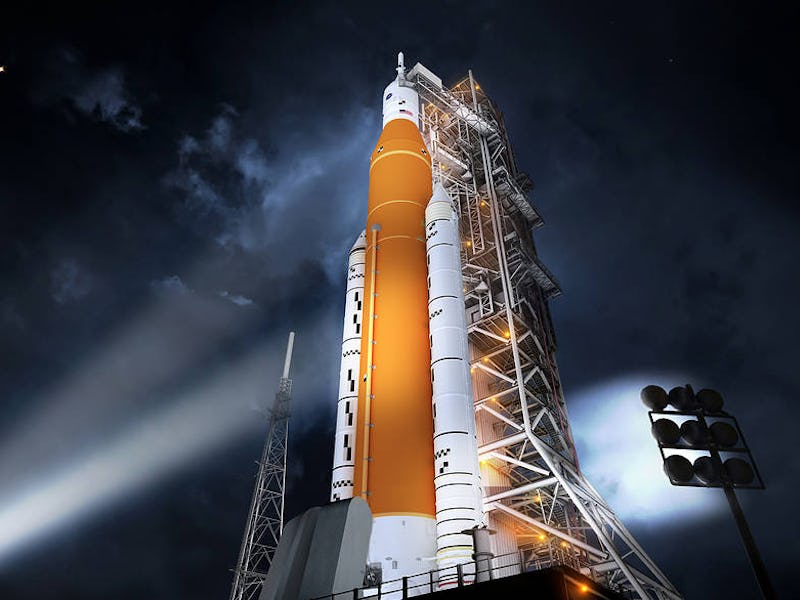Artemis 1 Moon rocket succeeds in critical preflight test
Plus: Beer might improve your gut health, according to a new study.

At NASA’s Kennedy Space Center, early on Monday morning, the Artemis 1 team got the “go” to begin tanking the rocket. First, they chilled down the umbilicals to cool the fuel, made of liquid oxygen and liquid hydrogen. Next, they pumped hundreds of thousands of gallons of it into Artemis 1. The simulated countdown began. Whatever happened next would be crucial in deciding whether the rocket was ready for the moon.
This is an adapted version of the Inverse Daily newsletter for Wednesday, June 22, 2022. Subscribe for free and learn something new every day.
Welcome to Wednesday, earthlings. We’ve got a detailed rundown of Artemis 1’s latest prelaunch test, plus more science stories to quench your curiosity.
Researchers used radiometric dating to chart the historic rainfall in the southern Arabian Peninsula.
Ancient stalagmites point to a massive drought that upturned 6th century Arabia
Extreme climate events can alter the course of history, the authors of a new paper published in Science say. Researchers identified a significant drought that likely occurred from around the year 500 to 530 CE, coinciding with the demise of the powerful Himyarite Kingdom in what is today called Yemen.
This drought would not only have killed the kingdom’s crops, but it would also have disrupted the existing social and political order, making the kingdom’s irrigation infrastructure difficult to maintain, compounding the crisis.
The authors also connect it to another major event: the rise of Islam in the region in the following century.
More on how climate can shape our world.
Moonshot incoming!
NASA’s Artemis 1 completes a major test to finally reach the moon
Before NASA’s Artemis 1 program can return humans to the moon, the rocket must ace a series of technical tests. In these trial runs, known as wet dress rehearsals, Artemis 1 is fully fueled and taken through a launch countdown up until 10 seconds before liftoff.
On Monday, NASA ran its fourth and most recent wet dress rehearsal. Like the three previous attempts, it wasn’t without some hurdles, including a hydrogen leak.
Despite the setbacks, though, the agency was able to complete the test. Launch director Charlie Blackwell-Thompson called it a "great day for our team.”
The Artemis team is gathering for the next few days to assess the issues encountered in the rehearsal. Depending on the outcome, NASA may opt for a fifth wet dress rehearsal, or it may be able to confirm a launch date for Artemis 1, reopening an era of human lunar exploration.
The most famous crew on the Galápagos.
8 rare species thought to be extinct that actually aren’t
For over a century, researchers believed that the giant tortoise Chelonoidis phantasticus was extinct. Yet low and behold, in 2019, they sequenced the genome of another living Galapagos tortoise and discovered that it was the same species. Nature has surprised us like this more than once.
When humans enter an environment, it changes. Species become endangered. Certain flora and fauna disappear. How lucky we are to rediscover a handful of species thought to be extinct.
It takes dedicated scientists, sometimes an expedition into a collapsed cave. But in a few cases, an organism once thought lost forever gets another shot at being protected.
Beer belly, but make it biodiverse.
Beer might improve gut health, study finds
According to a recent study published in the Journal of Agricultural and Food Chemistry, drinking beer may improve the gut microbiome’s diversity. Increased biodiversity has been linked to a healthy gut, which elevates body and mind.
In the study, participants drank 330 mL (11 ounces) — just over half a pint — of either 0 percent or 5.2 percent alcoholic beer each day for four weeks. At the end, both groups showed improved biodiversity, independent of alcohol content.
“We hope that people can see that moderate beer consumption as a part of a well-balanced diet can be used as a strategy to improve our microbiota,” Ana Faria, one of the study authors, told Inverse. “Particularly the responsible choice of non-alcoholic beer.”
Does that mean you should down more pints? Perhaps not so fast. Experts are split on the findings.
I’ll take one pilgrimage, please!
About this newsletter: Do you think it can be improved? Have a story idea? Want to share a story about the time you met an astronaut? Send those thoughts and more to newsletter@inverse.com.
- On this day in history: On June 22, 2013, Mount Fuji gained UNESCO World Heritage status, bolstering its level of the protection and conservation.
- Song of the day: “Tití Me Preguntó” by Bad Bunny